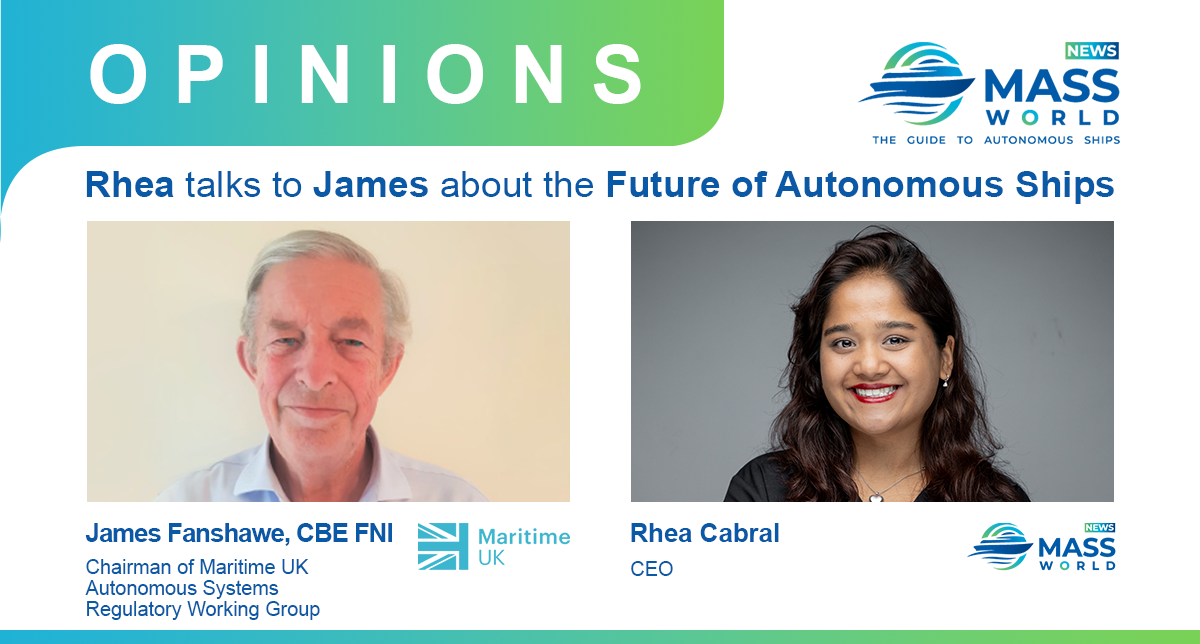Rhea Talks with James about the Future of Autonomous Ships

MASSworld.news CEO Rhea Cabral talks to James Fanshawe Chairman of Maritime UK Autonomous Systems Regulatory Working Group
James Fanshawe retired from the Royal Navy in 2005 after Commanding HMS HURWORTH, CLEOPATRA and FEARLESS, the UK Task Group and the Devonport Flotilla. He chairs the UK’s Maritime Autonomous Systems Regulatory Working Group, which has released the Industry Code of Practice for the safe operation of Maritime Autonomous Ship Systems. He is a member of the UK MASG Council, NFAS and ICMASS. He is the moderator for the UNECE work on Autonomy on Inland Waterways. He works within a mixed commercial portfolio. He is a Director of ZULU Associates and The Anglo Belgian Shipping Company.
❓ The 9th Autonomous ship conference is soon upon us. How do you think what has changed with Autonomous Ships since 1st conference?
? They have become an operational reality after the early innovator steps.
? The depth and breadth of knowledge and experience, and therefore the level of debate, have increased exponentially.
❓ What are blocking points at the moment for the expansion of MASS technologies?
? There are few significant blocking points, but they do exist.
? The cultural approach to the use of unmanned, zero emission vessels still has to be developed.
? There remains a lack of practical experience amongst many engaged in the regulatory aspects of MASS technology and operations.
? It is a learning phase for all as we build a validated set of databases.
❓ Local authorities are rather active in autonomous ships regulations, but when do you expect anything valuable from IMO?
? Later this year with the publication of the voluntary IMO Code of Practice.
❓ In your opinion which countries are now in the front of civil MASS and why?
? There are a number of European nations leading on the development of civil MASS, including the UK, Belgium and Norway.
? Several nations in the Far East are leading the way.
? Where there is firm political leadership, underpinned by a strong industrial base and commitment to achieve results, there are positive moves to develop MASS for commercial use on both open and inland waters.
❓ What helps the UK to be among the top MASS countries, what can other countries gather from the UK’s experience?
? The UK has been at the front of the MASS story over many years in both the civil and defence sectors.
? Always difficult to identify what can be gathered from the experience of others. There is a keen awareness that this is a team effort in both garnering the optimum technological solutions but also the operational use of these vessels between countries.
❓ What are the current developments for MASS in the UK? Please highlight some of them for us.
? Defence for various operational capabilities.
? Short Sea container vessels.
? Maritime Research.
? A variety of enabling technologies.
? Effective trials and testing facilities.
❓ In the time of emerging technologies what would you recommend for young people – study as a seafarer or a course dedicated to Autonomous shipping?
? A combination of both. The two are intertwined.
? It is always recommended for young people to get some sea time and the appropriate qualifications for any career in the maritime sector.
? These can always be transferred and used in Autonomous Shipping.
❓ In your opinion, what changes would we see within the maritime industry with an increase of non-seafarers ROCs as operators?
? My short answer is as few as possible whilst the role of ROCs are established.
? MASS represent a minority of vessels at sea.
? The primary aim for all mariners is to achieve the highest levels of safety for all at sea. Unmanned operations are a key enabler to achieve this.
? A lot of work is being undertaken to ensure that all those who work within ROCs have the appropriate training and qualifications and that these are regularly monitored and assessed.
? There is an active debate about whether ROC personnel should be seafarers. There is a strong case for this to be so.
See also related
Countries
Recent updates
BlackSea Technologies introduces Modular Attack Surface Craft USV Family
ACUA Ocean builds second Pioneer-class USV
Nordic USV to acquire two more HydroSurv's USVs
Subsea Europe Services enters USV market with the C-RECON 13-ES
US NOAA: National Oceanic & Atmospheric Administration deploys Oshen's USVs for hurricane research
Exail secures sale of DriX H-9 long-range Uncrewed Surface Vessel
Reach Subsea’s USV Reach Remote 2 sets sail for Australia
PBO Marine starts building solar and wind powered Sail Machines USV
Saronic and American Bureau of Shipping announce partnership
